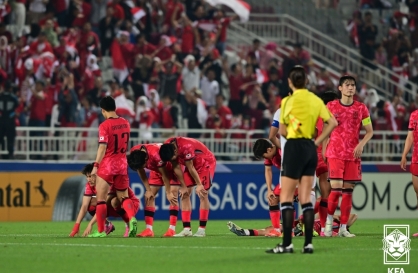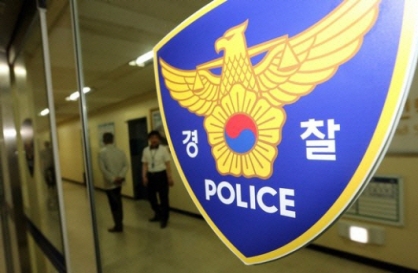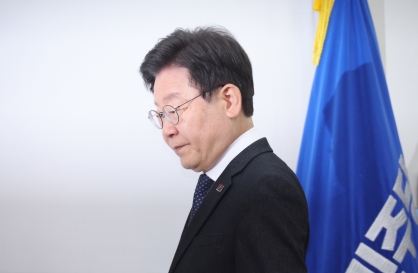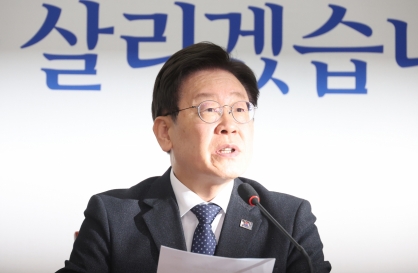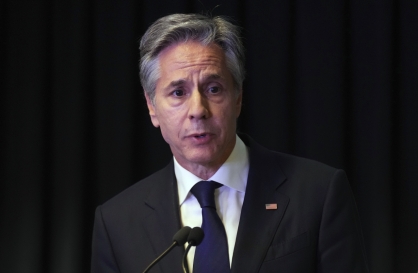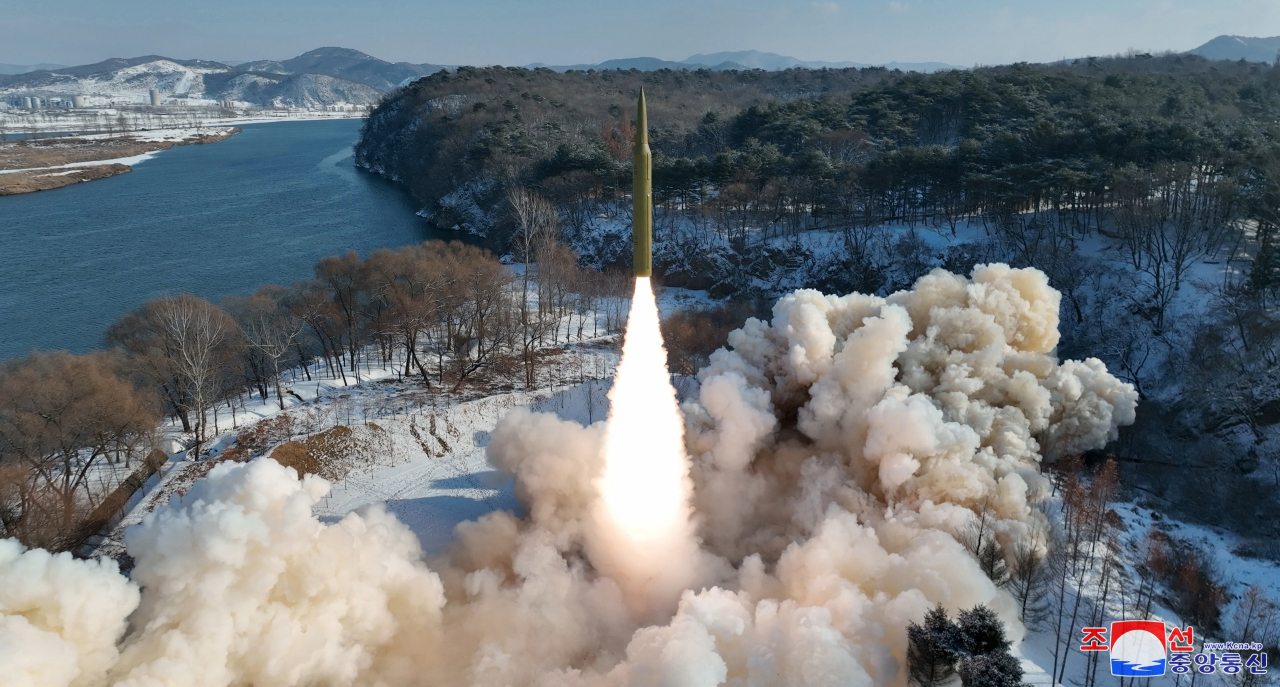 |
This photo, carried by North Korea's official Korean Central News Agency on Monday, shows North Korea's launch of a solid-fuel intermediate-range ballistic missile (IRBM) carrying a hypersonic warhead the previous day. (Yonhap) |
North Korean state media on Monday claimed that the country had successfully test-fired a solid-fuel hypersonic missile with an intermediate-range for the first time on Sunday, the same day the country's foreign minister arrived in Russia.
The South Korean military said it was evaluating North Korea's claim.
Hypersonic missiles fly at lower altitudes, offering greater maneuverability up through the terminal phase, and travel at speeds of at least Mach 5, equivalent to five times the speed of sound. The unique characteristics may pose challenges to the missile defense systems used by South Korea, the US and Japan.
North Korea's state-run media said that the test was successful.
"The (test-firing) was aimed at verifying the gliding and maneuvering characteristics of (an) intermediate-range hypersonic maneuverable controlled warhead and the reliability of newly developed multi-stage high-thrust solid-fuel engines," North Korean state media said in an English-language dispatch.
The test launch -- which violates multiple UN Security Council resolutions that prohibit North Korea from using ballistic missile technology -- took place on the day North Korean Foreign Minister Choe Son-hui departed Pyongyang and arrived in Russia.
Choe was scheduled to make an official visit to Russia on Monday for three days. She was invited by Russian Foreign Minister Sergei Lavrov, North Korean state media reported Monday.
The top nuclear envoys of South Korea, the US and Japan on Sunday jointly condemned North Korea's ballistic missile launch and the "serious impact of military cooperation between Russia and North Korea, including North Korea's transfer of ballistic missiles to Russia, on international security," according to South Korea's Foreign Ministry.
The three also agreed to "take concerted actions while keeping close tabs on related developments" Choe's visit to Russia during their phone conversation.
"The representatives of the three countries commit to strengthen coordination on North Korea within the UN Security Council, considering the concurrent beginning of the tenure of the three countries at the Security Council."
North Korea and Russia have openly flouted UNSC resolutions, with Russia abusing its veto power at the Security Council to block any measures against North Korea's ballistic missile launches.
Yang Uk, a military expert and researcher at the Asan Institute for Policy Studies, said the launch is seen as a deliberate message to the international community amid mounting criticism of North Korea's weapons transfer and Russia's employment of North Korean weapons and ballistic missiles to attack war-torn Ukraine.
"North Korea has already declared that it will persist in its offensive toward South Korea throughout the year, starting with shelling provocations at the beginning of the year. The launch of intermediate-range missiles is seen as a message, indicating the country's determination to resist the international community," Yang said.
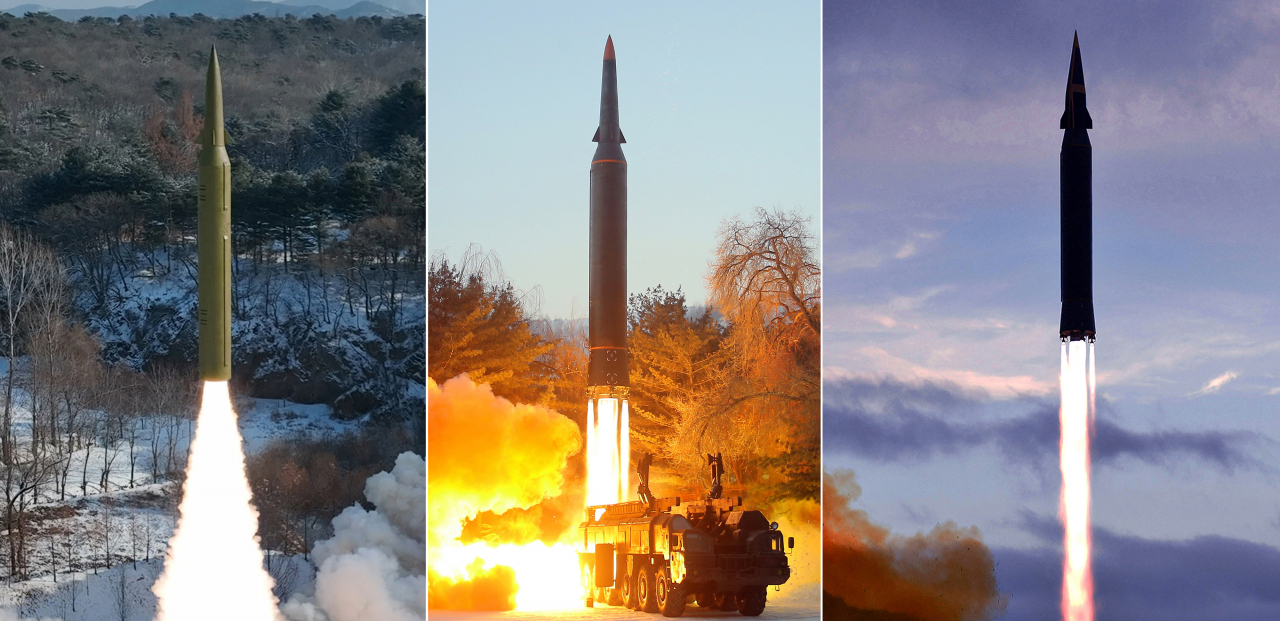 |
From left to right: The test launch of a solid-fuel, hypersonic missile on January 14, 2024, and hypersonic test launches using liquid-fuel propulsion in January 2022 and September 2021. (Yonhap) |
South Korea's Unification Ministry on Monday said that the South Korean government strongly condemned North Korea's "statements and actions aimed at fostering division" within South Korean society that has continued since the beginning of the year.
"There may be a testing requirement for technical purposes, coupled with the intention of sowing unease within our society," the Unification Ministry's spokesperson Koo Byung-sam said during a press briefing when asked about potential reasons behind North Korea's missile launch. "Additionally, there is a distinct possibility of seeking to assert a presence in the international community."
North Korea had previously conducted launches of the purported "hypersonic missile Hwasong-8" in September 2021 and an unnamed hypersonic missile twice in January 2022. However, the three earlier tests were carried out using a liquid-fueled engine.
If North Korea has successfully tested a solid-fuel missile featuring a hypersonic glide vehicle, then Sunday's launch confirms a noteworthy advancement.
Experts assessed that North Korea's test launch served multiple objectives, observing that North Korea seems to have employed a new solid-fuel engine for a new type of intermediate-range ballistic missile or IRBM. Ground tests for the solid-fuel engine were conducted in November.
"In the end, it appears that North Korea is concurrently pursuing the development of a hypersonic missile equipped with a solid propellant engine and a solid-fuel IRBM,” said Chang Young-keun, the director of the Missile Center at the Korea Research Institute for National Strategy in Seoul.
"But the latest test appears to be more focused on the development of a first-stage high-thrust solid rocket for an IRBM rather than serving as a test launch for the development of a hypersonic missile."
Chang said North Korea is expected to soon conduct test launches of hypersonic missiles as well as solid-fuel IRBMs.
"Particularly, hypersonic missiles with intermediate range would prove useful in targeting Guam while circumventing the missile defense system of the United States," Chang said.
Kim Dong-yub, a professor at the University of North Korean Studies, said that maneuverability and speed during the terminal phase were critical factors for a hypersonic missile. He refrained from providing an assessment of the performance of the test launch citing the lack of available information on these aspects.
The professor pointed out that the test launch appeared to have a close connection to the declaration made by North Korean leader Kim Jong-un during the year-end party plenum in 2023.
The leader highlighted that the primary focus for 2024 would be the prompt completion of tasks that were falling behind in accomplishing the five key objectives outlined in the five-year defense development plan announced during the 8th Party Congress in January 2021.
“One of the most notable tasks that remain unfinished is likely the development of a hypersonic glide vehicle. No confirmed test launches in this regard have taken place for the past two years," professor Kim said. "It is highly likely that this will be one of the tasks that North Korea will prioritize and centralize its focus on in 2024."
